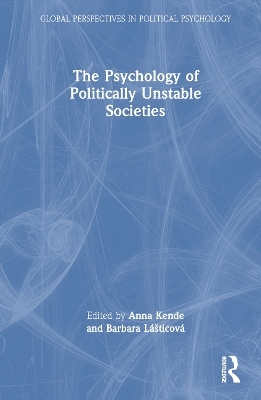
The Psychology of Politically Unstable Societies
Routledge (Verlag)
978-1-032-25228-5 (ISBN)
Written by a team of international leading researchers, the book critically re-evaluates the relevance of concepts primarily developed in WEIRD (Western, Educated, Industrialized, Rich and Democratic) contexts, for non-WEIRD societies. It focuses particularly on East-Central Europe and South Africa, showing how they enjoy some privileges of WEIRD countries but are also characterized by a troubled history and relative deprivation. Covering psychological concepts such as political trust, conspiracy thinking, authoritarianism, populism, autochthony, social identity and prejudice, the chapters illustrate that psychology has the tools to explain the recurring and shared problems of these societies.
This original book is ideal for scholars and students in social psychology, political science and social science. It will also be useful reading for policy makers, political analysts and anyone who wishes to understand their role in creating more stable and more just societies.
Anna Kende is a professor of social psychology at the Institute of Psychology of ELTE Eötvös Loránd University, Budapest, Hungary. Her main research interests are intergroup conflicts, prejudice, political action and intergroup solidarity, mainly in the context of East-Central Europe and its largest ethnic minority group, Roma people. Barbara Lášticová is a senior researcher at the Institute for Research in Social Communication of the Slovak Academy of Sciences in Bratislava, Slovakia. Her main areas of research include intergroup relations (focusing on prejudice reduction in educational settings), social identity and collective action on behalf of disadvantaged groups.
List of contributors
1. The psychology of politically unstable societies: An introduction
Barbara Lášticová and Anna Kende
Part I: Societal and political processes
2. Corruption, cynicism, and the slow build-up of trust within weak democratic tradition
Girts Dimdins
3. The role of right-wing authoritarianism in support for populist leaders
Maciek Bieńkowski and Mikolaj Winiewski
4. The paranoid style in East-Central European politics
Péter Krekó
Part II: Group processes
5. Simmering hostilities, group identity, and contested autochthony beliefs in settler societies
Sibusiso Maseko and Kevin Durrheim
6. Challenging the nation in crisis-ridden societies: Nationalism and xenophobia revisited
Xenia Chryssochoou
7. European vs. National identity in post-conflict countries: The case of Croatia and Serbia
Margareta Jelić and Vladimir Mihić
Part III: Intergroup relations
8. Collective narcissism and the clash of advantaged and disadvantaged groups
Agnieszka Golec de Zavala and Oliver Keenan
9. Instilling women’s virtues and fighting an evil ideology: How national narcissism boosts prejudice against disadvantaged groups
Dagmara Szczepańska and Marta Marchlewska
10. Anti-Gypsyism as a historically lasting form of prejudice in politically unstable societies
Anna Kende and Barbara Lášticová
Index
| Erscheinungsdatum | 10.10.2023 |
|---|---|
| Reihe/Serie | Global Perspectives in Political Psychology |
| Zusatzinfo | 3 Tables, black and white; 8 Line drawings, black and white; 8 Illustrations, black and white |
| Verlagsort | London |
| Sprache | englisch |
| Maße | 156 x 234 mm |
| Gewicht | 494 g |
| Themenwelt | Geisteswissenschaften ► Philosophie |
| Geisteswissenschaften ► Psychologie ► Allgemeine Psychologie | |
| Geisteswissenschaften ► Psychologie ► Sozialpsychologie | |
| Naturwissenschaften ► Geowissenschaften ► Geografie / Kartografie | |
| Sozialwissenschaften ► Politik / Verwaltung ► Politische Theorie | |
| Sozialwissenschaften ► Soziologie ► Makrosoziologie | |
| Sozialwissenschaften ► Soziologie ► Spezielle Soziologien | |
| ISBN-10 | 1-032-25228-6 / 1032252286 |
| ISBN-13 | 978-1-032-25228-5 / 9781032252285 |
| Zustand | Neuware |
| Informationen gemäß Produktsicherheitsverordnung (GPSR) | |
| Haben Sie eine Frage zum Produkt? |
aus dem Bereich


